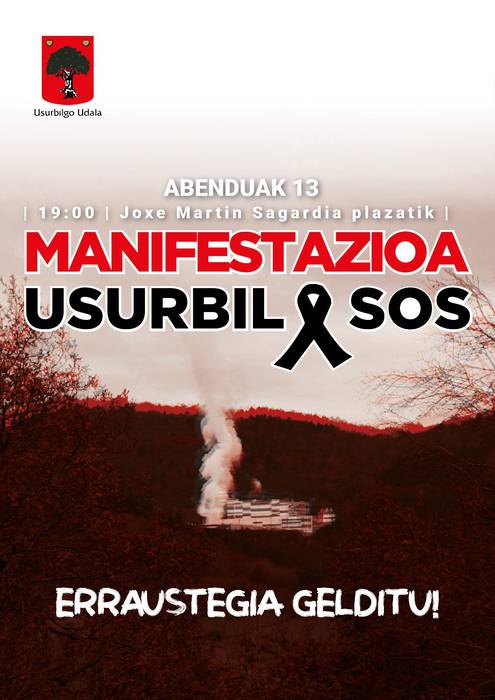The City of Usurbil appeals to Gipuzkoa: SOS Usurbil, paralysing the incinerator
- On Tuesday, the City of Usurbil held a press conference in the plenary of the Casa Consistorial to call SOS Gipuzkoa. "We are very concerned, very concerned, and that is why we make the request for help, SOS Deiak," added Geroa Bai. Starting from this concern and this discomfort, among other initiatives, he has called a demonstration for Friday at 19:00 at the entrance of the City Hall under the motto "SOS Usurbil, incinerator pare".

Here is the full statement made by the members of the government team:
SOS Usurbil, paralysing the incinerator
We are members of the municipal government team of the City Council of Usurbil and we have called you to make known the concern, gravity and decisions made by the corporation in the last municipal plenary. As you know, the Zubieta incineration plant was put into testing on 28 November. What are the coincidences, when and on the same day that the European Parliament declared the climate emergency, the activity that will produce the most CO2 emissions in Gipuzkoa began. If the issue were not serious and worrying, it seems that usurbildarras have not made us a joke of bad taste. But unfortunately, it's not a joke.
We're very concerned because we're seeing the huge columns of smoke coming out every day from the fireplaces in the incinerator. You don't have to be an expert on pollution issues to know that that sputum won't bring us anything good. They have become part of our landscape but we are not prepared to accept it as such. It is often said that an image has more strength than a thousand words and we believe that this everyday image perfectly reflects the future that we are going to leave to our children, to our future generations. A black, harmful, polluted future. It's the image of our failure. The failure of this generation of institutional and political representatives. We are not going to get into the vicissitudes that the incinerator project has had, but we believe that we are dealing with an ethical, democratic, ecological and economic problem. Nobody wants it by their side and yet we have been sold as if it were necessary. This ethical dilemma takes on a drastic dimension if one takes into account the negative health and environmental effects of incineration.
There are many studies published in serious, reliable and modern journals to highlight the health damage of the incinerator plant and place it at the level of evidence. The Zubieta Lantzen association has recently carried out a scientific study prior to the incineration plant being set up. To start measuring pollutants, two research lines have been opened; in localities close to zone zero of the incineration plant. In the chicken cooks samples have been taken to measure dioxins, and the groups of mothers Usurbil, Lasarte-Oria and Andoaigo have donated breast milk for study. It is a question of repeating these tests before they are started and in the years after they are started. We shall therefore have to look at what they say. However, the credibility of these investigations will be undermined. In addition, we do not need to share the same view, but talking about health, the mere risk should be sufficient to apply the principles of responsibility and prevention, above all. Health and the environment are of particular concern to us, the influence that today’s and tomorrow’s citizens and the world we will leave to future generations. We assume that it will be a concern shared by all of us who have institutional responsibility. In any case, when we talk about this project, these are not our only concerns, we are also concerned by the other two parties. On the one hand, the high economic cost of the project and what that will affect the municipalities. On the other hand, ignoring the directives that mark Europe for the future, rejecting the sustainable path for the treatment of waste that is taking place in different locations in Gipuzkoa. From a human, social, ecological and economic point of view, setting up the incinerator is a big step backwards; the disaster.
Although they want us to believe otherwise, Usurbil and other peoples in Gipuzkoa have shown that there is an alternative. We usurbildarras have shown that it is possible to manage waste taking into account health and the environment. 10 years ago we made a small change in our customs and today we selectively collect almost 90% of the waste generated in the municipality. We hardly generate rejection. So the incineration plant in our people is hardly going to go anything. However, what we will have to pay for that service that has been imposed on us is extremely expensive. In fact, the GHK charging system, instead of charging the rejection, rewards it. Recycling is therefore expensive for our citizens. We're very concerned, very concerned, and that's why we're making the call for help, SOS. On the one hand, we have sent a letter to all the mayors of Gipuzkoa. We are confident that the complicity generated by the responsibility of the post will facilitate understanding. Over and above the debates and logics between the parties, we have asked them to bring the issue of the Zubieta incinerator to the plenary of their peoples so that, without political deadlock and on the basis of the well-being of the citizens, they channel the debate on this subject into ethical, democratic and ecological parameters. With responsibility. Several mayors have responded and we only have words of thanks to them. On the other hand, we have asked for a meeting with the Deputy General of Gipuzkoa, Markel Olano, to convey our concern and discomfort to him at first hand. It is precisely on this Friday that the City of Usurbil has called for a demonstration that will be based on this concern and this public concern.
We call to participate in the demonstration that will start at 19:00 hours from Plaza Joxe Martin Sagardia, in front of the City Hall. Because we need you next door, SOS Usurbil, start the incinerator. We will end the hearing with a phrase that sounds a lot in Usurbil. He who has a head doesn't want to have it close to him, and he who has a heart doesn't want it anywhere.






















